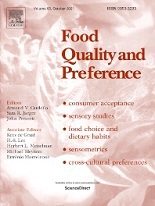Parents’ mental associations with ultra-processed products for their infant children: insights to improve complementary feeding practices
Dublin Core
Título
Tema
Abstract
Increasing consumption of ultra-processed products from early age has raised growing concerns. In this context, the aims of the present work were: i) to explore the automatic mental associations raised by packages of ultra-processed products among parents of children under 12 months of age, ii) to estimate the valence of the affective reactions elicited by ultra-processed products, and iii) to explore the influence of socio-demographic variables and feeding styles on the valence of parents’ associations with ultra-processed products. A total of 419 parents of children under 12 months of age were recruited at 20 health facilities that offer well-child services, selected using probability proportional to size sampling based on the number of births at each institution. Participants were presented with the labels of six ultra-processed products (corn snack, frankfurters, milk dessert, orange juice, wafer cookies, yogurt) and were asked to indicate the first words that came to their mind. The products raised mixed mental associations, which were mainly related to pleasure and health. Responses from the majority of participants (61–82%) evidenced negative associations with corn snacks, frankfurters and wafer cookies, whereas responses from 35 to 45% of the participants suggested a positive affective reaction towards orange juice, milk dessert and yogurt. Likelihood of having a positive affective reaction towards the evaluated ultra-processed products was higher for parents of 1 to 4 months infants, as well as those from low educational level and low socio-economic status. In addition, beliefs about three feeding practices (restriction on diet quality, indulgence in screen use and pressure for finishing) significantly influenced the valence of the associations. Results from the present work suggest the need to implement regulatory measures to reduce positive associations with ultra-processed products among parents and contribute to reduce their consumption among infants.
Fuente
Editor
Fecha
Derechos
Información sobre Derechos de Autor
(Por favor lea este aviso antes de abrir los documentos u objetos)
La legislación uruguaya protege el derecho de autor sobre toda creación literaria, científica o artística, tanto en lo que tiene que ver con sus derechos morales, como en lo referente a los derechos patrimoniales con sujeción a lo establecido por el derecho común y las siguientes leyes (LEY 9.739 DE 17 DE DICIEMBRE DE 1937 SOBRE PROPIEDAD LITERARIA Y ARTISTICA CON LAS MODIFICACIONES INTRODUCIDAS POR LA LEY DE DERECHO DE AUTOR Y DERECHOS CONEXOS No. 17.616 DE 10 DE ENERO DE 2003, LEY 17.805 DE 26 DE AGOSTO DE 2004, LEY 18.046 DE 24 DE OCTUBRE DE 2006 LEY 18.046 DE 24 DE OCTUBRE DE 2006)
ADVERTENCIA - La consulta de este documento queda condicionada a la aceptación de las siguientes condiciones de uso: Este documento es únicamente para usos privados enmarcados en actividades de investigación y docencia. No se autoriza su reproducción con fines de lucro. Esta reserva de derechos afecta tanto los datos del documento como a sus contenidos. En la utilización o cita de partes debe indicarse el nombre de la persona autora.
Formato
Idioma
Tipo
Identificador
Document Item Type Metadata
Original Format
- Fecha de agregación
- July 30, 2021
- Colección
- Bibliografía Nacional Química
- Tipo de Elemento
- Document
- Etiquetas
- Alimentación complementaria, Asociación de palabras, Investigación cualitativa
- Citación
- Vidal, Leticia, “Parents’ mental associations with ultra-processed products for their infant children:insights to improve complementary feeding practices,” RIQUIM - Repositorio Institucional de la Facultad de Química - UdelaR, accessed July 26, 2024, https://riquim.fq.edu.uy/items/show/6298.
- Archivos

